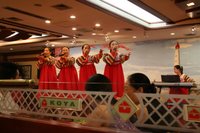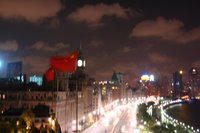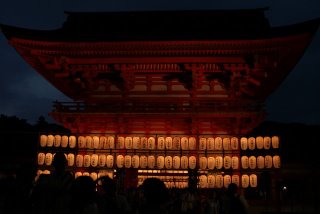20 August 2006
More on China and Japan
This op-ed piece in the Washington Post by George Will hits the nail on the head when it comes to Sino-Japanese relations and how Yasukuni affects them. I rarely agree with Will, but he is intellectually consistent and his points here are very insightful.
19 August 2006
The Middle Kingdon: Part 2
If one was to take a snapshot of a typical scene and China and typical scene in Japan and was to ask some unfamiliar with the area which society was democratic and which was authoritarian, it is likely that they would confused democratic Japan with authoritarian China. The sheer aggressiveness and boisterousness of Chinese culture seems more similar to the American way of life as opposed to the more sedate and mellow character of the Japanese. Even my friend Patrick, after spending two weeks in both countries, said that China seemed more familiar to him than Japan.
I definately did not have an overt sense that every aspect of the average Chinese was being curtailed by the Chinese Communist Party, or that anyone seemed upset that they were denied their political rights and civil liberties - although this is what happens when the government is highly skilled at suppressing dissent while ensuring stability and producing noticable results in the form of economic growth and development. Outside of major urban centers and tourist attractions, things are likely to be very different.
Unfortunately, I found out my potential blog audience was reduced by nearly a quarter by the CCP who has taken the liberty of blocking Blogger and its blogs. Wikipedia was also blocked and don't even bother with the three Ts: Tibet (part of China), Taiwan (part of China), or the Tiannamen Square Incident of 1989 (zilch).
One of the more interesting conversations I had was with a former roommate from London and her husband. Both of them work for the Chinese Ministry of Foreign Affairs, both have lived for years in the Middle East, the husband was actually a member of the delegation that helped set up the Chinese embassy in Bahgdad. The conversation inevitably turned toward Japan and - more precisely - Sino-Japanese relations. They had very critical things to say about Koizumi's insistence to visit Yasukuni, and expressed concern that while the Chinese government was handling things pragmatically, the Japanese were risking their own standing with these official visits. They said that every time they spoke about Japan to other Chinese, most Chinese would grow almost instantly hostile.
Of course a lot of this IS the government's doing. The CCP, under Mao Zedong, was the established as the party of the people, the workers and peasants that made up the vast majority of the Chinese population. In the 1970s, after the disasters that were the Great Leap Forward the Cultural Revolution, as well as with the death of Mao, the party opened its economy, repaired its relations with the west, and seemed to abandon its working class, anti-capitalist ideology. Today, this is even more apparent, and the CCP knows it. As a result, it has tried to maintain its legitimacy by identifying itself as the champions of the Chinese nation, the result of which has been a surge in nationalist and patriotic sentiment, and along with this identity has come an increase in anti-Japanese sentiment. Hostility toward Japan has grown so strong, the CCP may be unable to curtail it.
I will continue this tomorrow...
I definately did not have an overt sense that every aspect of the average Chinese was being curtailed by the Chinese Communist Party, or that anyone seemed upset that they were denied their political rights and civil liberties - although this is what happens when the government is highly skilled at suppressing dissent while ensuring stability and producing noticable results in the form of economic growth and development. Outside of major urban centers and tourist attractions, things are likely to be very different.
Unfortunately, I found out my potential blog audience was reduced by nearly a quarter by the CCP who has taken the liberty of blocking Blogger and its blogs. Wikipedia was also blocked and don't even bother with the three Ts: Tibet (part of China), Taiwan (part of China), or the Tiannamen Square Incident of 1989 (zilch).
One of the more interesting conversations I had was with a former roommate from London and her husband. Both of them work for the Chinese Ministry of Foreign Affairs, both have lived for years in the Middle East, the husband was actually a member of the delegation that helped set up the Chinese embassy in Bahgdad. The conversation inevitably turned toward Japan and - more precisely - Sino-Japanese relations. They had very critical things to say about Koizumi's insistence to visit Yasukuni, and expressed concern that while the Chinese government was handling things pragmatically, the Japanese were risking their own standing with these official visits. They said that every time they spoke about Japan to other Chinese, most Chinese would grow almost instantly hostile.
Of course a lot of this IS the government's doing. The CCP, under Mao Zedong, was the established as the party of the people, the workers and peasants that made up the vast majority of the Chinese population. In the 1970s, after the disasters that were the Great Leap Forward the Cultural Revolution, as well as with the death of Mao, the party opened its economy, repaired its relations with the west, and seemed to abandon its working class, anti-capitalist ideology. Today, this is even more apparent, and the CCP knows it. As a result, it has tried to maintain its legitimacy by identifying itself as the champions of the Chinese nation, the result of which has been a surge in nationalist and patriotic sentiment, and along with this identity has come an increase in anti-Japanese sentiment. Hostility toward Japan has grown so strong, the CCP may be unable to curtail it.
I will continue this tomorrow...
18 August 2006
The Middle Kingdom: Part 1
I have been back in Japan for over 72 hours and have had ample time to reflect upon my two week sojourn in China, the cradle of East Asian civilization. China is a massive nation that seems to relish in its contradictions. Many of my preconceptions of what I thought China would be like were grossly off the mark. Japan, this is not, that much is crystal clear. I must confess that I know even less than I thought I knew before I landed in Shanghai's Pudong Airport on August 2nd.
Actually Patrick and I got our first taste on China atKansai Airport while we were waiting in line to check in. Some guy was trying to cut in front of the entire line, and outright refused when a leader of a tour group told him to get in the back of the line. He was relentless, although he did not attempt to cut in front of us, instead he got in right behind us, as the Japanese behind us were not willing to put up much resistance. That was my first taste of being in a country with no queue culture.
Upon arriving in Shanghai, we were greeted by my friend Sally and her niece Leilei. Sally, who lives in San Francisco, was visiting friends in Shanghai while her husband Peter was on business and was kind enough to take care of Patrick and I for the first week of our trip. We took the maglev train, hurtling at over 400 km an hour into downtown Shanghai and really did not have a dull moment for the next two weeks...
A few highlights from Shanghai would have to include the following:
1. North Korean food, complete with waitresses in traditional garb, sporting DPRK insignias, performing numbers straight from Pyonyang's top 40, as well as some Celine Dion thrown in for good measure.

2. Drinking along the Bund, the colonial waterfront of Shanghai, replete with some of finest examples of late 19 century art deco in Asia.

3. Barbarosa, a bar on an island in the middle of People's Square. It is where the who's who of Shanghai go to mingle and Patrick and blended in, disappeared with our knowledge of Mandarin, local customs, as well with some help from our more fluent, better dressed friends.
4. Old Shanghai. Great bargains. Beautiful gardens. A nice break from number...
5. Pudong. The new Shanghai, with the Oriental Pearl, Jin Mao building, a psychadelic tunnel, enormous shopping complexes, etc. Modernity in all its shimmering glory.

I will continue this narrative in a few days...
Actually Patrick and I got our first taste on China atKansai Airport while we were waiting in line to check in. Some guy was trying to cut in front of the entire line, and outright refused when a leader of a tour group told him to get in the back of the line. He was relentless, although he did not attempt to cut in front of us, instead he got in right behind us, as the Japanese behind us were not willing to put up much resistance. That was my first taste of being in a country with no queue culture.
Upon arriving in Shanghai, we were greeted by my friend Sally and her niece Leilei. Sally, who lives in San Francisco, was visiting friends in Shanghai while her husband Peter was on business and was kind enough to take care of Patrick and I for the first week of our trip. We took the maglev train, hurtling at over 400 km an hour into downtown Shanghai and really did not have a dull moment for the next two weeks...
A few highlights from Shanghai would have to include the following:
1. North Korean food, complete with waitresses in traditional garb, sporting DPRK insignias, performing numbers straight from Pyonyang's top 40, as well as some Celine Dion thrown in for good measure.

2. Drinking along the Bund, the colonial waterfront of Shanghai, replete with some of finest examples of late 19 century art deco in Asia.

3. Barbarosa, a bar on an island in the middle of People's Square. It is where the who's who of Shanghai go to mingle and Patrick and blended in, disappeared with our knowledge of Mandarin, local customs, as well with some help from our more fluent, better dressed friends.
4. Old Shanghai. Great bargains. Beautiful gardens. A nice break from number...
5. Pudong. The new Shanghai, with the Oriental Pearl, Jin Mao building, a psychadelic tunnel, enormous shopping complexes, etc. Modernity in all its shimmering glory.

I will continue this narrative in a few days...
01 August 2006
Grabs from 御手洗祭

Thanks again Ai Ling for the photos!
Matsuri in a nutshell: plenty of lanterns, dipping your feet in cold water, dango eating contest. Less crowded than Gion or Tenjin albeit not as grand in scope.


Wet Hot Japanese Summer
The spring semester at Doshisha ended officially yesterday, marking the end of my fourth month in Japan. I am heading for Shanghai tomorrow morning for two weeks of being a shameless tourist. Beforehand, however, I wanted to take a moment to reflect upon the past few months that I have spent in Kyoto and at Doshisha.
I must first say that the people here have been amazing, and sadly, many are returning home soon and will not be coming back, although I did get some free stuff as a result. Anyway, these wonderful people know who they are, so if I didn't say it before, I will say it now: it has been a true privilige.
Summer is not going to be all fun and games. I need to grab the bull by the horns and seriously commit myself to Japanese and to establishing a more concrete foundation for my research, which - I will wholeheartedly admit - I have not done ANYTHING up to this point.
But that is gonna change pretty damn quickly...
I must first say that the people here have been amazing, and sadly, many are returning home soon and will not be coming back, although I did get some free stuff as a result. Anyway, these wonderful people know who they are, so if I didn't say it before, I will say it now: it has been a true privilige.
Summer is not going to be all fun and games. I need to grab the bull by the horns and seriously commit myself to Japanese and to establishing a more concrete foundation for my research, which - I will wholeheartedly admit - I have not done ANYTHING up to this point.
But that is gonna change pretty damn quickly...